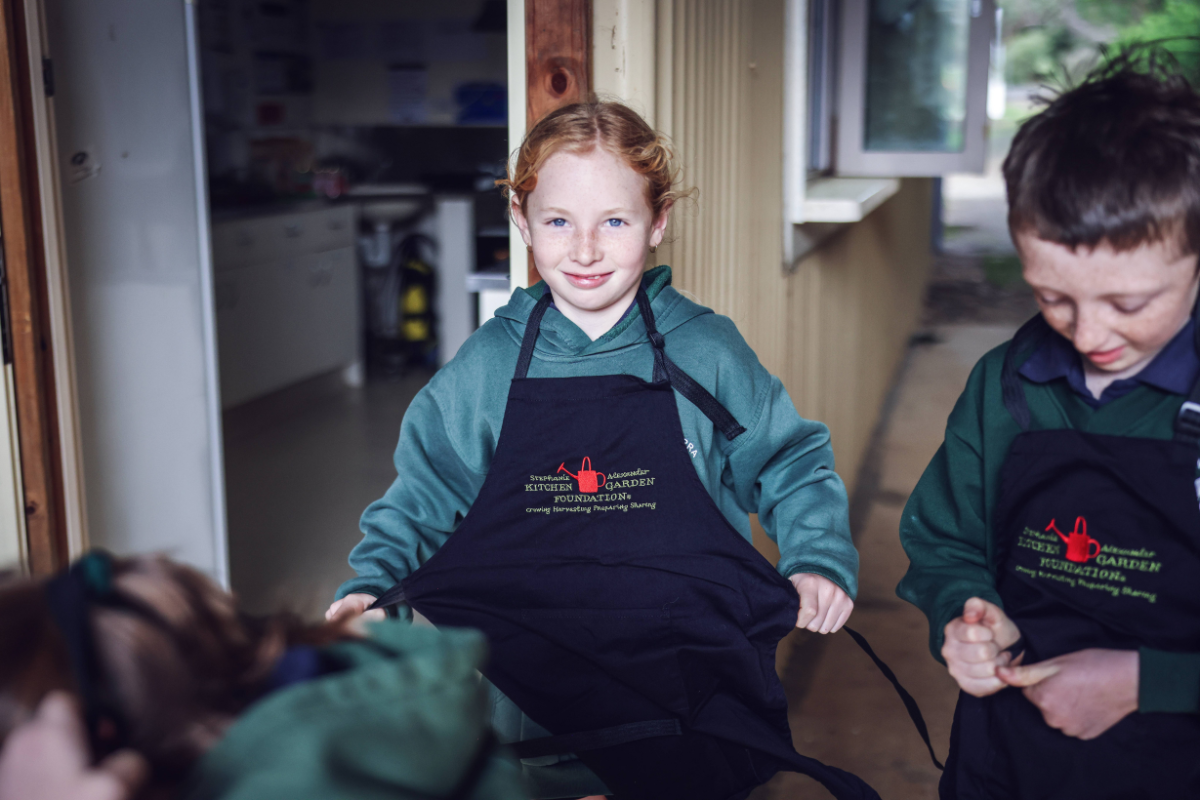Community impact in the Western District of Victoria

Since July 2024, our Western District Kitchen Garden Project has been actioning community-led preventative health goals to increase the health and wellbeing of regional children, young people and their families in Southern Grampians Shire, Glenelg Shire, Moyne Shire, Edenhope, Willaura and Lake Bolac.
Leaning on the Kitchen Garden Foundation’s 20 years of experience, our place-based Project Lead, Monique Sobey, has collaborated with local leaders, community groups and other impactful organisations in the region, providing hands-on support to all schools, early learning services, sports clubs and other community-focused organisations that want to boost healthy food access for children and their families.
Today, thirteen schools and four community settings have benefitted from our place-based support, including Winda-Mara Aboriginal Corporation, Port Fairy Community House, the Australian Breastfeeding Association and Youth HQ. That’s an estimated 1,500 children and young people in regional communities developing practical, empowering life skills through hands-on education.
Food education for regional youth hub and young mums
The Kitchen Garden Program is often credited with becoming the hub of the community. One of the community settings involved is Youth HQ in Casteron. This is an indispensable destination for local youth who are often lost in small rural communities because of the lack of inclusive, dynamic after-school options and organised sport. Young people drop in to the community centre to be together in a safe, supervised environment with an exciting range of programs and activities designed to engage and inspire.
The Western District Kitchen Garden Project has strengthened the activity options at Youth HQ with seasonal pizza-making sessions and sustainable gardening sessions with versatile herbs and summer seedlings. Recipes and seeds were given out to young people at both these sessions, so their new skills could be continued at home. The next phase is discussing a small community garden so even more young people can experience the holistic benefits of growing fresh, affordable, healthy food to care of their health and the planet.
At Port Fairy Community House, the Young Mums Group has up to 30 participants attending each session. Monique has collaborated with the community house to engage with young parents and their pre-school and playgroup-aged children to give them a taste of fun, delicious food education. The sessions allow new parents to explore simple, hands-on ways to use garden-grown food for their health and wellbeing and link it to school-readiness for their young children.
Strengthening intergenerational community connections
In the school space, Monique’s schedule has her working alongside 13 schools — nine of which are members of the Kitchen Garden Program — to help embed food environment resilience for students, staff and families.
St Joseph’s Primary School in Coleraine has worked with Monique to elevate their Kitchen Garden Program with an intergenerational component, supporting connections between students and the local aged care centre. Aged care residents often come to the school for gardening and afternoon tea, and in turn, students go to the residential aged care centre to help in their garden, sing, and play board games.
“Monique has become a wonderful part of our school community, and her passion for healthy food alternatives shines through with her friendly and engaging manner”, says Nicole Forbes, a teacher at St Joseph’s Primary School in Penhurst. “The Kitchen Garden Program provides our students with the opportunity to experience a wide range of healthy foods and supply our summer crop of seedlings, which the students tend to daily by weeding, harvesting, or watering. Students have developed a love of gardening, and a few have begun vegetable gardens at home. The program ticks many boxes of the Victorian Curriculum and we are hoping to continue our association with it throughout 2025.”
Evidence suggests that providing hands-on, contextual learning opportunities, delivered through kitchen and garden settings, improves educational outcomes across diverse curriculum areas and supports student retention, school enjoyment and parent engagement. Additionally, an evaluation of the Kitchen Garden Program by the University of Melbourne found strong evidence of positive social outcomes for children, schools and communities involved in the program.
Using our pleasurable food education approach, the Western District Kitchen Garden Project is creating impactful results across healthy eating efforts for school students, families and community residents.
The Western District Kitchen Garden Project is made possible through the generous support of the Handbury Foundation and Ace Radio. We are currently seeking matched funding to extend the impact of our community work in the region. Please reach out if there are ways you can support the extension of this community momentum and reach of this impactful place-based project.
< Back to Latest News
